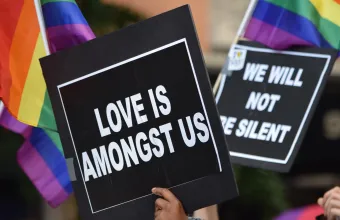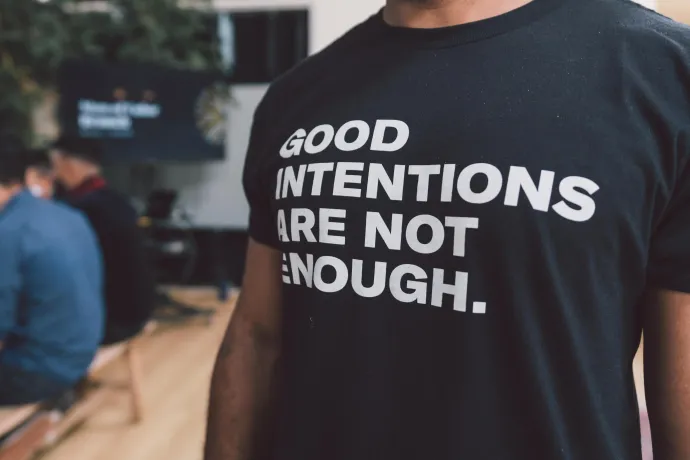National Coming Out Day: A Celebration of Who We Truly Are
Cass A. reflects on what coming out has meant to him and how revealing our truth brings us closer together.
How did I come out? That’s a complicated question. I’ve come out many times throughout my life: as a lesbian, stone butch, transsexual, transgender, queer, non-monogamous – and I’m sure there will be more as I continue to grow and discover the complicated, nuanced, layered, and ever-changing human being that I am. Coming out as a person who identifies as lesbian, gay, bi, transgender, queer, etc. (LGBTQ+) is an act of bravery because the world still tells LGBTQ+ people that we are wrong and unwanted, that we will be ostracized and targeted for acts of hate and violence. And yet we have the tenacity to fight through that messaging and be seen for who we truly are.
Coming out can have real tangible consequences. For me, coming out meant losing dear, lifelong friends. Coming out meant distancing myself from certain friends and family members because of their inability to accept me for who I am. Coming out meant removing some people from my life entirely due to their outright hatred for LGBTQ+ people. Coming out meant co-workers trying to get me fired when they learned I was LGBTQ+ identified.
As you can imagine, there is a big emotional toll related to coming out. I've never met a single person who didn't lose something or someone in the process of coming out. Many people lose family, friends, access to support networks or social circles, their job, and even their home. Even now, as an LGBTQ+ activist who is very out and visible, I'm constantly running safety-checks to see if it's okay for me to reveal my truth. And no, it is not always safe.
I've never met a single person who didn't lose something or someone in the process of coming out. Many people lose family, friends, access to support networks or social circles, their job, and even their home.
We often think of coming out as limited to sexual, relational, or gender identity, but there are a whole host of non-sexual, non-relational, or non-gender identity ways to come out. For example, I've come out as left-handed, a nerd, someone who has invisible chronic illnesses, the co-parent of a disabled person, coming from a meager upbringing in rural America, the child of divorced parents at a young age, a first-generation college graduate in my family, an ambivert, someone who suffers from social anxiety, and so much more.
Coming out – showing your truth – is an act of vulnerability. It can be scary to reveal something deep or intimate about yourself – especially when it is something that society-at-large, for whatever reason, doesn't talk about or support. But coming out is an amazing way to build community and spread understanding and awareness. Coming out helps us forge deeper relationships. And coming out makes us realize that, despite how different we may seem, we actually have a lot in common.
Coming out is an amazing way to build community and spread understanding and awareness.
October 11th is National Coming Out Day in the United States. This day is recognized in commemoration of the 1987 National March on Washington for Lesbian and Gay Rights. 31 years later this day is still very important and necessary. Too many people are hiding their LGBTQ+ identities from the world in fear of the hate, violence, and isolation that is far too common for people in the LGBTQ+ community.
It’s important to recognize all the ways in which we come out – the many different identities we hold because of our life experience. You don't have to be a part of the LGBTQ+ community to come out. Even if you are a member of a dominant or privileged group, you can empathize and relate to the act of coming out. Are there things in your life that you've been reticent to share with others for fear of judgement? Perhaps you too could benefit from coming out.
When someone does come out to you, take it seriously, because it is not something they do lightly. You should treat this as a privilege because it shows they trust you with their revelation. They are telling you who they truly are so that you can have a deeper and more connected relationship. This is a gift. Remember, someone coming out to you is not permission for you to out them to others. It is never your job to out someone else. Doing so could cause them great harm or loss.
Remember, someone coming out to you is not permission for you to out them to others. It is never your job to out someone else. Doing so could cause them great harm or loss.
This National Coming Out Day, whether you are LGBTQ+ identified or not, we all have the opportunity to support each other and show solidarity with the LGBTQ+ community by coming out as our true selves, whatever that may be.
“As we let our own light shine, we unconsciously give other people permission to do the same. As we are liberated from our own fear, our presence automatically liberates others.” – Marianne Williamson








We encourage you to share your thoughts on your favorite social platform.